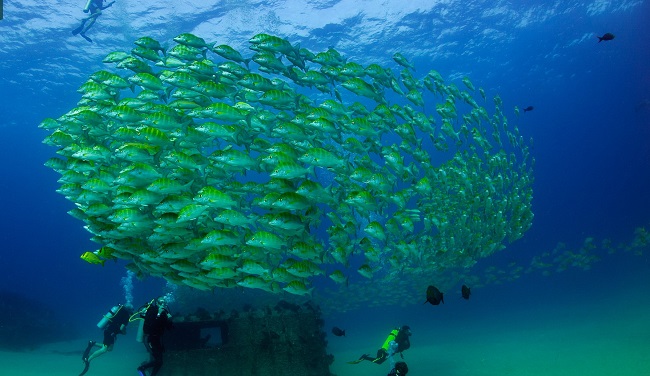Senior Lecturer, Federal College of Fisheries and Marine Technology, Dr Kayode Olubiyi, on Saturday, July 25, 2020 advocated proper education of Africans on the wealth of oceans.

Olubiyi made the advocacy at a webinar to celebrate the African Union Day of Seas and Oceans.
The webinar had the theme: “Innovation for a Sustainable Ocean”.
It was organised by the Ocean Ambassadors Foundation in conjunction with Mundus Maris ASBL.
Olubiyi said that adequate understanding of the worth of the oceans would ensure that its $24 trillion worth of resources would be well utilised.
According to the don, if Africa can manage the various resources emanating from the ocean such as wildlife, beaches, movement of materials and goods from one country to another, in a sustainable way, it will be to its advantage.
He said that the way the ocean was being treated in Africa was not healthy, noting that waste – both liquid and solid from land – polluted the ocean and led to serious damage.
“The way forward is that we must take decisions and work to having a Sustainable Blue Business Plan.”
Olubiyi said that there should be a better way of waste disposal through recycling.
He also urged stoppage of the use of plastic bottles or polythene and end to dredging.
He said that Africans should see ocean as common wealth that must be protected and utilised to generate power.
Dr Alban Igwe, Director, Council for Regulation of Freight Forwarding in Nigeria (CRFFN), said at the event that 38 African countries had the benefit of coastal water and should reap the opportunities that abounded on the sea.
Igwe spoke on “Sustainable Supply Chain: Linking the African Coastal States”.
He said that opportunities abounded on the African sea.
According to him, Africa is the second largest continent and has 100 ports surrounded by 30,500km coastline.
The director said that Africa should tackle illegal fishing worth $1 billion.
He noted that the continent’s 90 per cent import and export were by sea, adding that it had access to Atlantic, Indian, Mediterranean and Arabian sea routes.
He called for the development of the Blue Economy Road Map, creation of a regional blue centre in Kenya (East), Nigeria (West), Morocco (North) and South Africa (South), to help utilise the opportunities.
“We need to make progress by also investing in human capital, defining competitive strategy and setting realistic time lines and action plans,” he said.
According to Igwe, the supply chain is the right strategy in today’s world as it connects people.
He said that the strategy unleashed creativity, ensured effective utilisation of resources and connected dots for more efficiency.
Mrs Jean Chiazo-Anishere, Continental President, Women in Maritime (Africa), said that the first step for African countries to take would be integrating skills development strategy into development plans.
Chiazo-Anishere spoke on the topic: “Building on Human Resource Capital for the Future of African Maritime Economy”.
She said that the maritime industry played a prominent role in any economy and, when handled wisely, could reduce poverty, lead to skills acquisition and others benefits.
“Education is key in building human capital; investing in it will lead to productivity; so, there is the need for continuous review of educational system to ensure relevance, and the curriculum should align.
“There should be establishment of an industry-owned training institute, private sector investment and participation in education to complement government efforts,” she said.
In her contribution, Prof. Stella Williams, Vice President, Mundus Maris ASBL, said that fisheries and aquaculture would help to sustain the ocean and promote the economy.
She added that there was the need to teach young Africans to understand the ocean, identify and adopt relevant research results and abide by the many sustainable goals for the ocean.
According to her, there should be a collective actions that will propel both men and women in the sector.
She listed the actions to include education.
“To scale things up, there is need to keep the pressure on reforms, strengthen local capacity and enlarge the academy for intellectual platform.
By Chiazo Ogbolu
